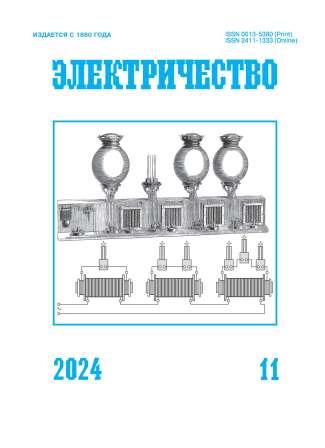Electrical Engineering and Artificial Intelligence: Public and Legal Relations, Education and Communication, Threats
DOI:
https://doi.org/10.24160/0013-5380-2024-11-4-8Keywords:
electrical engineering, artificial intelligence, electrical engineering education, communications, society, law, threatsAbstract
The digital transformation of electrical engineering as the genetic basis of modern man-made civilization affects all spheres of human activity. The use of artificial intelligence (AI) technologies in electrical devices, complexes and systems requires understanding of the problems and challenges that arise for humans and society. The article discusses the problems of social and legal relations related to the use of AI in electrical engineering. The main problem is the legal identification of AI and the "socialization" of systems with strong AI. The possibilities and problems of using AI in electrical engineering education, and the related problem of communication between humans and AI systems are analyzed. The social consequences of using AI in education are discussed. The problem of threats from the use of AI systems in electrical engineering is highlighted. Psychological, existential and local threats are noted, as well as private manifestations of threats in the humanitarian sphere (violation of confidentiality, the problem of responsibility, manipulation of consciousness, etc.). Legal matters concerned with the security of using AI systems in Russia, the European Union, and the USA are considered.
References
2. Бутырин П.А., Алпатов М.Е. Цифровизация и аналитика в электротехнике. – Электричество, 2021, № 10, с. 4–10.
3. Кутахов В.П. Технологии искусственного интеллекта как основа боевых действий ХХI века. – Защита и безопасность, 2021, № 1(96), с. 20–21.
4. Балыбердин В.А., Маркелов Е.Б., Шаклин Е.Ф. Искусственный интеллект на службе у полевого командира. – Защита и безопасность, 2022, № 4(103), с. 22–23.
5. Ляндау Ю.В., Темирбулатов А.У. Обзор применения технологий искусственного интеллекта в электроэнергетической отрасли. – Инновации и инвестиции, 2023, № 8, с. 304–309.
6. Иерархическое моделирование систем энергетики / под ред. Н.И. Воропая, В.А. Стенникова. Новосибирск: Академическое изд-во «Гео», 2020, 314 с.
7. Андреев А.Л., Бутырин П.А., Горохов В.Г. Социология техники. М.: Альфа–ИНФРА, 2009, 288 с.
8. Человек и системы искусственного интеллекта / под ред. В.А. Лекторского. СПб.: Юридический центр, 2022, 328 с.
9. Хабриева Т.Я. Правовые проблемы идентификации искусственного интеллекта. – Вестник РАН, 2024, т. 94, № 7, с. 609–622.
10. Бутырин П.А. Трансформации высшего электротехнического образования в России. – Электричество, 2022, № 5, с. 4–8.
11. Минина В.Н. Цифровизация высшего образования и ее социальные последствия. – Вестник Санкт-Петербургского университета. Социология, 2020, т. 13, № 1, с. 84–101.
12. ГОСТ Р 59895–2021. Технологии искусственного интеллекта в образовании. Общие положения и терминология. М.: Российский институт стандартизации, 2021, 12 с.
13. ГОСТ Р 70949–2023. Технологии искусственного интеллекта в образовании. Применение искусственного интеллекта в научно-исследовательской деятельности. Варианты использования. М.: Российский институт стандартизации, 2023, 16 с.
14. Системный анализ и принятие решений: словарь справочник / под ред. В.Н. Волковой, В.Н. Козлова. М.: Высшая школа, 2004, 616 с.
15. Гопник Э. Машина будь человеком. – В мире науки, 2017, № 8-9, с. 58–64.
16. Аветисян А.И. Искусственный интеллект в гуманитарной среде. Угрозы и возможности. – Вестник РАН, 2024, т. 94, № 7, с. 623–628.
17. Аветисян А.И. Доверенный искусственный интеллект. – Вестник РАН, 2024, т. 94, № 3, с. 200–209.
18. Указ Президента Российской Федерации 10.10.2019 г. № 490 «О развитии искусственного интеллекта в Российской Федерации» (в ред. от 15.02.2024).
19. Кодекс этики в сфере искусственного интеллекта [Электрон. ресурс], URL: https://ethics.a-ai.ru/assets/ethics_files/2023/05/12/Кодекс_этики_20_10_1.pdf [дата обращения 11.09.2024].
20. Конуэй Э., Орескес Н. Информация меняет общество. – В мире науки, 2020, № 11, с. 24–32.
#
1. Butyrin P.А. Elektrotekhnika i obshchestvo (Electrical Engineering and Society). М.: Izd-vо МEI, 2024, 152 p.
2. Butyrin P.A., Alpatov М.Е. Elektrichestvo – in Russ. (Electricity), 2021, No. 10, pp. 4–10.
3. Kutahov V.P. Zashchita i bezopasnost' – in Russ. (Defense and Security), 2021, No. 1(96), pp. 20–21.
4. Balyberdin V.A., Markelov E.B., Shaklin E.F. Zashchita i bezopasnost' – in Russ. (Defense and Security), 2022, No. 4(103), pp. 22–23.
5. Lyandau Yu.V., Temirbulatov A.U. Innovatsii i investitsii – in Russ. (Innovation and Investment), 2023, No. 8, pp. 304–309.
6. Ierarhicheskoe modelirovanie sistem energetiki (Hierarchical Modeling of Energy Systems) / Ed. by N.I. Voropai, V.A. Stennikov. Novosibirsk: Akademicheskoe izd-vo «Geo», 2020, 314 p.
7. Andreev A.L., Butyrin P.A., Gorohov V.G. Sotsiologiya tekhniki (Sociology of Technology). M.: Al'fa –INFRA, 2009, 288 p.
8. Chelovek i sistemy iskusstvennogo intellekta (Man and Artificial Intelligence Systems) / Ed. by V.A. Lektorsky. SPb.: Yuridicheskiy tsentr, 2022, 328 p.
9. Habrieva T.Ya. Vestnik RAN – in Russ. (Bulletin of the Russian Academy of Sciences), 2024, vol. 94, No. 7, pp. 609–622.
10. Butyrin P.A. Elektrichestvo – in Russ. (Electricity), 2022, No. 5, pp. 4–8.
11. Minina V.N. Vestnik Sankt-Peterburgskogo universiteta. Sotsiologiya – in Russ. (Bulletin of St. Petersburg University. Sociology), 2020, vol. 13, No. 1, pp. 84–101.
12. GОSТ R 59895–2021. Tekhnologii iskusstvennogo intellekta v obrazovanii. Obshchie polozheniya i terminologiya (Artificial Intelligence Technologies in Education. General Provisions and Terminology). М.: Rossiyskiy institut standartizatsii, 2021, 12 p.
13. GОSТ R 70949–2023. Tekhnologii iskusstvennogo intellekta v obrazovanii. Primenenie iskusstvennogo intellekta v nauchno-issledovatel'skoy deyatel'nosti. Varianty ispol'zovaniya (Artificial Intelligence Technologies in Education. The Application of Artificial Intelligence in Research Activities. Use Cases). М.: Rossiyskiy institut standartizatsii, 2023, 16 p.
14. Sistemnyy analiz i prinyatie resheniy: slovar' spravochnik (System Analysis and Decision-Making: Dictionary Reference) / Ed. by V.N. Volkova, V.N. Kozlov. М.: Vysshaya shkola, 2004, 616 p.
15. Gopnik E. V mire nauki – in Russ. (In the World of Science), 2017, No. 8-9, pp. 58–64.
16. Avetisyan A.I. Vestnik RAN – in Russ. (Bulletin of the Russian Academy of Sciences), 2024, vol. 94, No. 7, pp. 623–628.
17. Avetisyan A.I. Vestnik RAN – in Russ. (Bulletin of the Russian Academy of Sciences), 2024, vol. 94, No. 3, pp. 200–209.
18. Ukaz Prezidenta Rossiyskoy Federatsii (Decree of the President of the Russian Federation) No. 490 dated 10.10.2019).
19. Kodeks etiki v sfere iskusstvennogo intellekta (Code of Ethics in the Field of Artificial Intelligence) [Electron. resource], URL: https://ethics.a-ai.ru/assets/ethics_files/2023/05/12/Кодекс_этики_20_10_1.pdf [Date of appeal 11.09.2024].
20. Conway E., Oreskes N. V mire nauki – in Russ. (In the World of Science), 2020, No. 11, pp. 24–32




